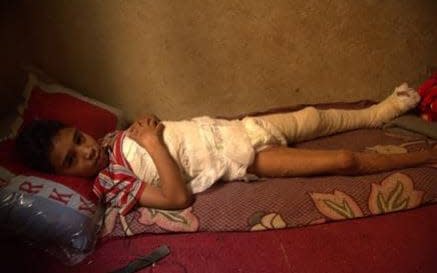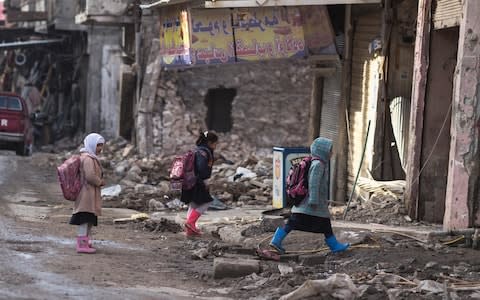We can no longer turn our backs on the invisible war waged on the world's children

In the early hours of the morning in the summer of 2015 a missile hit the home of 12-year-old Saleh in the Yemeni city of Taiz. He woke up in flames, buried under rubble. After a year and a half in hospital in a city far away from home, and many operations to treat his burns, Saleh is only now beginning to stand up and walk again.
This weekend military commanders and defence ministers, including the UK Defence Secretary Gavin Williamson, will gather in Germany for the Munich Security Conference, a self-styled "marketplace for ideas" on global security.
Yet the world’s most vicious and least reported war is not even a footnote on the agenda. That war is being waged with a brutal intensity every day against children like Saleh and millions of others across the world.
New research has revealed the scale of the invisible war on children. Based on data from conflict zones around the world, we estimate that some 175,000 children under the age of five die as a result of armed conflict every year.
In the next hour, another 20 children will be added to this body-count. The majority will be young babies who did not survive to their first birthday.
Being a child in a war zone is more dangerous than being an armed combatant. Our research shows that for every soldier or militia member who loses their lives, another five children are killed.
Most of the child deaths are a result of the malnutrition, poverty, diseases and collapse of health systems that come with wars waged in poor countries.

When I visited the main hospital of Hodeida last year, I met a little boy called Ahmed, a two year old with stick-like limbs, a swollen belly and pneumonia. He was drifting in and out of consciousness as he fought such severe hunger.
In today’s wars, starvation is deadlier than bullets – and most victims are children. In the case of Yemen, as many as 85,000 children are estimated to have died from extreme hunger.
Yet many of the deaths are a direct consequence of a humanitarian blockade imposed by Saudi Arabia and the United Arab Emirates, or the reported restrictions of aid by Yemen's rebel Houthi movement.
Children are killed, maimed or traumatised as a result of direct impacts of war. There are around 420 million children living in close proximity to armed conflict – and the numbers are rising.
Whilst these children are protected by humanitarian and human rights laws, provisions that every armed force has a responsibility to uphold, the reality is that rules protecting children are violated with near total impunity.
So, here is the question for all of us. Should we wring our hands in despair at the violence being inflicted on children? Or should we act on our common humanity and build a movement that protects children affected by conflict? Turning our backs and tolerating crimes committed against children diminishes us as an international community.

Daunting as the challenges may be, we can make a difference. We are today marking our centenary by launching a global campaign called Stop the War on Children, with three simple objectives.
First, we need to make the invisible war on children visible. It is high time that UN agencies and governments started reporting on the war against children, documenting the casualties and naming those responsible.
As one of the largest members of Nato, a permanent member of the UN Security Council and member of the G7, Britain can help transform the lives of children around the world. By updating its civilian protection strategy – and putting children front and centre of policies covering diplomacy, defence and aid – the UK can make a real difference.
Second, it is time to bring down the curtain on the culture of impunity surrounding crimes committed against children.
Political leaders and military commanders who authorise humanitarian blockades, murder children in buses, bomb schools and fail in their duty to uphold laws protecting children should not be attending security conferences in Munich.
They should be standing in the dock of courts, like the International Criminal Court in the Hague, and the UK should be leading the charge.
Third, we need to help the children traumatised by war rebuild their lives. That means providing the psycho-social support and the education needed to restore hope. Our aim is to deliver that support to 200,000 children over the next three years.
One hundred years ago our founder Eglantyne Jebb described the cry of a child as "the only international language". A century later, children are still crying out for our support and protection. It’s time we started listening.
Kevin Watkins is chief executive of Save the Children UK

Protect yourself and your family by learning more about Global Health Security

 Yahoo News
Yahoo News 
